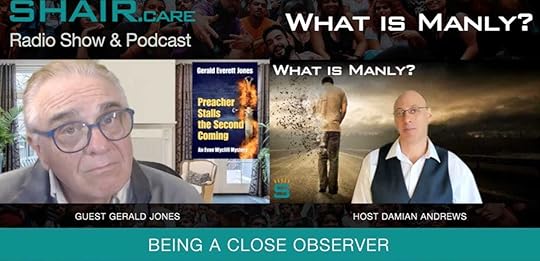Gerald Everett Jones's Blog: Gerald Everett Jones - Author, page 28
September 24, 2023
Guest Post from Melbourne: Being a Close Observer with host Damian Andrews
Here’s the audio version of the talk I posted as a video session.
Connect the dots. Read between the lines.Readers do better in the real world because they’ve already been there, done that.Connecting Los Angeles and Melbourne, SHAIR.care show host Damian Andrews and I talk across the Pacific Rim about the essential human trait of curiosity and how our experience of the world benefits from being close observers. When we read about spies and detectives, we’re learning how paying careful attention enriches our lives, helps keep us safe, and even promotes healthy and inspiring relationships.
Feed your curiosity with a paid subscription to this Thinking About Thinking blog. You’ll gain access to all content here, and you’ll be helping us build our worldwide community through storytelling and self-expression.

Mick & Moira & Brad - #me-three?
September 22, 2023
Book Review - Hollywood: The Oral History
Not exactly a coffee-break read. But don’t just buy it as a desk reference (although you might want to keep it nearby).
Jeanine Basinger was founder of the Cinema Studies Department of Wesleyan University, and Sam Wasson was among her most studious students. (Both have done well.)

Harper hardcover edition. Fine for casual reading laid out on your lap, but if you want to be able to search for stuff, buy the ebook as well. There’s so much in here, you will forget where you found that memorable snippet. Of course, you could dog-ear and underline, but you may want to keep your copy collectible!
Basinger joined the Wesleyan faculty the year after I graduated. There was no film department or major for me. My team shot a 16mm short in Humanities 101, a mandatory course we called “Freshman Sandbox.” I did get a chance to study the works of Robert Bresson and Sam Fuller in a course Larry Loewenger taught in the art department. (Larry also did well.)
Short story even shorter - I missed becoming a member of the Wesleyan Hollywood Mafia by a year. Ah, so. God must’ve wanted me to write books.
This book is an edited compilation of interviews with legendary filmmakers, most of them from the studio era that employed contract players and craftspersons. The source is the archives of the American Film Institute. Chapters are organized by work roles, and quotations from disparate sources are organized by topic and viewpoint to form conversational threads. Billy Wilder will seem to be commenting on Melvyn Douglas, who opines on something Bronislau Kaper says, which follows John Cromwell - as if they were all sitting around a table at The Stork Club. And, yes, most but not all of them were men. There are a few survivors in here, including Peter Bogdanovich and Basinger herself, who apparently knew Frank Capra well enough to characterize his laugh (but she does not explain the circumstances).
Full disclosure - I have not read it all. I did digest two sections: Directors and Writers. In our era post-New Wave, it’s widely held that directors are auteurs, yet none will boast they could make an award-winner from a bad script. In the studio system, writers worked with collaborators often not of their choosing, few directors liked them, and they were off the picture and onto the next before shooting started. The notion of major studios as film factories is a truism today. But striking among these conversations to me was how Edward Dmytryk, award-winning director of Crossfire (1947), described his feelings then about the industry’s place in history:
If we had all known that they were going to be still running these pictures forty or fifty years later… and asking us to get up and talk about them… we probably would have shot them differently… We thought the movie would go out and be run for a few weeks or a few months in the theater and then would be completely forgotten.
In these pages, the filmmakers alternately praise each other and talk trash, share gossip and debunk it: “Hollywood [is] the most cruel, the most despicable town in the world” (Ridgeway Callow) “But it’s a myth” (Stanley Donen). For most of these gods of cinema, it was a place to work and a paycheck.
George Cukor admired Ernst Lubitsch but couldn’t understand Citizen Kane. Fred Zinnemann admired Alfred Hitchcock but advised against imitating him. Vincente Minnelli was a superbly talented decorator from Broadway who stressed over details in the shot that showed up as little more than a quick blur on the screen. Norman McLeod rarely spoke above a whisper, even when coaching actors on set. John Ford bossed his cast and crew through gruff intimidation but was beloved by most of them, who called him “Pappy.”
One reason Frank Capra seems exceptional for his day is how he behaved like an auteur before the concept existed. Although his screenwriter Robert Riskin famously insisted “the Capra touch” couldn’t be put on a stack of blank paper, Capra made sure his vision was in the script, then fused the roles of director and producer, placing creative control above all else. For me, as an author who was an early self-publisher (with print-on-demand even before ebooks were a thing), I feel the same way Capra did about the importance of reaching an audience with an authentic voice. He put it this way:
I traded money for power to make the films I wanted to make… It’s me expressing myself… It was more important than money because I knew that the money would roll in if I ever got really successful. It never really rolled in, but it kind of accumulated a little bit toward the end.
These days, for self-expressive content creators, it accumulates at pennies per click. Case in point, Substack, bless ’em. What’s old is new again, and holding your own against “the front office” is as important as ever.
If the Motion Picture & Television Fund Retirement Home had a branch in Heaven, you’d swear Basinger and Wasson were eavesdropping!

Mick & Moira & Brad just won Gold in Romantic Comedy in one of the few competitions that’s open to both indie and mainstream publishers. (Ahem, unarguably best of the best.)
Dare I mention it’s a Hollywood story from behind the camera?
Feed your curiosity with a paid subscription to this Thinking About Thinking blog. You’ll gain access to all the content that’s here, and you’ll be helping us build our worldwide community through storytelling and self-expression.
September 20, 2023
Do I understand romantic comedy?
I was “thinking about thinking” even then. Would she have said I wasn’t paying attention? (I’d ask her if I could remember who she was. Was this a setup? We were dressed for a date, but I still had training wheels on my bike and exactly 25c in lunch money.)
 * Sneak announcement *
* Sneak announcement *Mick & Moira & Brad just won the Winner prize in Romantic Comedy in the 2023 New York City Big Book Awards (official announcement this Friday).

Feed your curiosity with a paid subscription to this Thinking About Thinking blog. You’ll gain access to all content here, and you’ll be helping us build our worldwide community through storytelling and self-expression.
September 13, 2023
Investigators (and Readers) as Close Observers
Connecting Los Angeles and Melbourne, SHAIR.care show host Damian Andrews and I talk across the Pacific Rim about the essential human trait of curiosity and how our experience of the world benefits from being close observers. When we read about spies and detectives, we’re learning how paying careful attention enriches our lives, helps keep us safe, and even promotes healthy and inspiring relationships.

Click here to watch this engaging, full-and-frank exchange of views.

Preacher Evan Wycliff is a close observer.
Feed your curiosity with a paid subscription to this Thinking About Thinking blog. You’ll gain access to all content here, and you’ll be helping us build our worldwide community through storytelling and self-expression.
Back to School! Back to Biz! Back to Campaigning!

The updated Fourth Edition includes not only corrections but also new chapters on uses and abuses of Big Data, along with 11 ways to create (er, spot) fake news. (Eric Hoffer Award Finalist in the Business category).
But, on the subject of crime,there’s still time left…THE FINE PRINT: The author is not a lawyer but expressly reserves the right to play one on TV. Readers must be cautioned that no relationship between this book and crime fiction is expressed or implied.

This mystery-thriller paperback giveaway from BookSweeps.com has been extended through Wednesday, September 20.
Thinking About Thinking is a reader-supported publication. To receive new posts and support my work, consider becoming a free or paid subscriber.
September 4, 2023
It's the Preacher's Paperback Giveaway!
Enter to win an autographed copy of Preacher Finds a Corpse, award-winning first novel in the Evan Wycliff Mystery series - plus a lot more!
This book giveaway is sponsored by BookSweeps.com (clicking on the link or the graphic will take you to their contest entry page).
Enter here for the prize drawing
BookSweeps will conduct the drawing after giveaway entries close on Wednesday, September 13. If you’re a winner, they will advise you when you will receive your gift.
Thank you for subscribing to Thinking About Thinking @geraldeverettjones on Substack. Opting for a paid subscription here will not improve your chances of winning BookSweeps prizes, but $5 per month or $30 per year will give you access to everything beyond the paywalls on this blog.
And you’ll also be advancing the cause of self-expression for thoughtful people like yourself.
Carry on! Read on! Write on!August 30, 2023
Harry’s First (and Last?) Safari (Part 2 of 2)
{continued from last Wednesday’s post]

Not quite autobiographical.
There followed a predictable period of no action and lethargy. Aldo reached into the ice chest and helped himself to a chilled cocktail in a can. Consuming liquor inside a moving vehicle was prohibited on the public highway, but here in the bush there were no rules. Harry wanted to stay alert and didn’t drink, but he was nevertheless feeling drowsy as the heat of the afternoon peaked.
Harry learned from Joseph, who was narrating to his guest almost nonstop whenever he wasn’t on the phone to his colleagues. There are three types of giraffe. One of them — the Maasai — lives here, identified by their distinctive body markings of jagged spots. Oddly, they eat mainly thorns as their long necks enable them to munch on the tops of acacia trees. Their tongues are tough as shoe leather with a surface rough as sandpaper. Giraffes appear calm as they stride elegantly across the wooded grassland, and, for the most part, they probably are. That’s because predators, including the big cats, are wary of them. An adult giraffe can defend itself and the young ones by swinging its head in a powerful downward arc, dealing a single, lethal body blow to the attacker.
August 27, 2023
Book Review: Life After God
I obtained an advance review copy of Life After God: Finding Faith When You Can’t Believe Anymore by Mark Feldmeir from NetGalley (the book was just released on August 22). I was intrigued by the title and the topic because my fictional Preacher Evan Wycliff might be characterized as an agnostic minister. Perhaps a more accurate description would be a practicing theologian who sometimes has doubts (doesn’t everybody?). In the mystery series that centers on him, Reverend Wycliff is a reluctant amateur sleuth. People in the small farm town he serves come to him with problems no one else seems to have any interest in solving.

Recently released from Westminster John Knox Press.
Life After God is a deeply thoughtful, first-person memoir—and confession, you might say. Like Evan, Feldmeir had serious doubts in divinity school, then as a Protestant pastor has asked himself continually why an omnipotent, loving God would permit evil to run rampant in the world.
Thinking About Thinking is a reader-supported publication. To receive new posts and support my work, consider becoming a free or paid subscriber.
I hope I’m not misrepresenting Feldmeir’s philosophy, but he seems to have concluded that God chooses to be neither omnipotent nor interventionist in earthly matters. God’s love is omnipresent and always forgiving. From the human viewpoint, free will prevails. The order of the universe is not predetermined, and it was designed that way. Each of us is free to seek the truth, according to our own perceptions and sensibilities. Feldmeir claims he concurs with rabbinic scholars when he describes God’s love as a “lure,” a scriptural interpretation attributed to Alfred North Whitehead. (Indeed, as Feldmeir explains in a footnote, much of his outlook is rooted in Whitehead’s process theology.)
The author’s philosophy—which he insists needn’t be yours—seems to be close, but not quite—existentialist. A basic premise of existentialism is that the universe is fundamentally empty of meaning. Meaning is a human invention, having evolved as an extremely effective tool for survival of the species.* Nevertheless, existential humanists would assert that, despite there being no meaning and therefore no rules, you and I are not free to simply do whatever we like. Humanists, like practitioners who swear by the Hippocratic Oath, seek above all to do no harm. Within that context, we’re free to embrace any meaning we can find as long as it helps us help others as well as ourselves.
Which brings us to Christian existentialism (and, again, I hope I’m not mischaracterizing): Even though the universe may be meaningless (mortals can’t know), Christian ethics can work—by humanist standards—rather like Winston Churchill’s assertion that democracy is the worst form of government—except for all the others that have been tried.
If you are looking for spiritual guidance, you might or might not find it in Life After God. For example, I found Feldmeir’s notions of eternity and the afterlife baffling—as if to say, “Try to do as Jesus advised, and we’ll both find out.”
A minor criticism I have is the layout of the book’s pages. The prose in both print and ebook editions is set with line breaks as though it were poetry. I don’t know enough about free verse to say whether it succeeds as such. As for me, the odd method of presentation was mildly annoying.
I found a nugget I’d never encountered before. Feldmeir quotes Whitehead’s speculation that Caesar’s royal legal advisors must have edited the gospels to make God the Father seem more authoritarian, as well as to obscure subtleties of Jesus’s teachings that might have encouraged independent thought. The objective was presumably to make future generations of Christians more subservient as citizens of Rome.
Perhaps it’s a quibble to question Whitehead’s reference to “Caesar,” which as a name used by itself typically means Julius Caesar (dead in 44 BC) or his son Caesar Augustus (dead in 14 A.D., presumably years before there existed any gospels to edit). Constantine (circa 300 A.D.) is thought to be the first Christian emperor, although his allegiance may have been political and pragmatic. Certainly, around the time of Theodosius (380 A.D.), Christian doctrine, if not text, was being extensively debated and reworked. At this time as well, Hermetic teachings, which form much of today’s New Age philosophy and are not so distant from Feldmeir’s, were suppressed. And the Christlike deity of Serapis (patron of Alexandria), who was reputed above all to be a miraculous healer, was all but erased.
Empty of meaning? Then why is force consistently equal to mass times acceleration? Rocket engineers would insist that it is and does, but then this quirky guy Einstein said, “It depends.”

Agnostic or just obsessively curious?
Thinking About Thinking is a reader-supported publication. To receive new posts and support my work, consider becoming a free or paid subscriber.
August 23, 2023
Harry’s First (and Last?) Safari (Part 1 of 2)

Harry traveled to East Africa expecting luxury resorts, hookups, and parties.
The lessons of life in its raw natural state were incremental and enduring for Harry. Less than an hour after they’d checked in at Satao Camp inside Tsavo East National Wildlife Reserve, Aldo and his party were navigating the tracks of the park, guided by Joseph, looking for telltale signs of the Big Five.
It didn’t take long for Harry to understand that going on safari could feel much like visiting a movie set, which he’d done a few times before in Los Angeles. There’s an unreality about it. This is real life, but some happenings are so unusual you doubt the evidence of your senses. Most of the time, you watch, and you wait. Nothing and no one around you seem to be moving. They are waiting, too, but few (except the director, perhaps not even the tour guide) know what to expect. Suddenly, at the periphery of your vision, people (or animals) come together and cluster around something that happens very rapidly. If you’re not on the lookout, paying close attention, you will miss it. Then the scene goes back to stasis.
You soon realize that much of the day will be downright boring. You live for the delight of anticipation, then the rare thrills.
August 19, 2023
Reading from 'Preacher Stalls the Second Coming'
Hosted by the Independent Writers of Southern California (IWOSC). Introduced by Ruth Frechman.

The fourth book in the series will be released later this year in ebook and trade paperback. The Kindle / EPUB ebook editions of the first book are available for free from most distributors, including Amazon, Apple, and Kobo.
Thinking About Thinking is a reader-supported publication. To receive new posts and support my work, consider becoming a free or paid subscriber.



